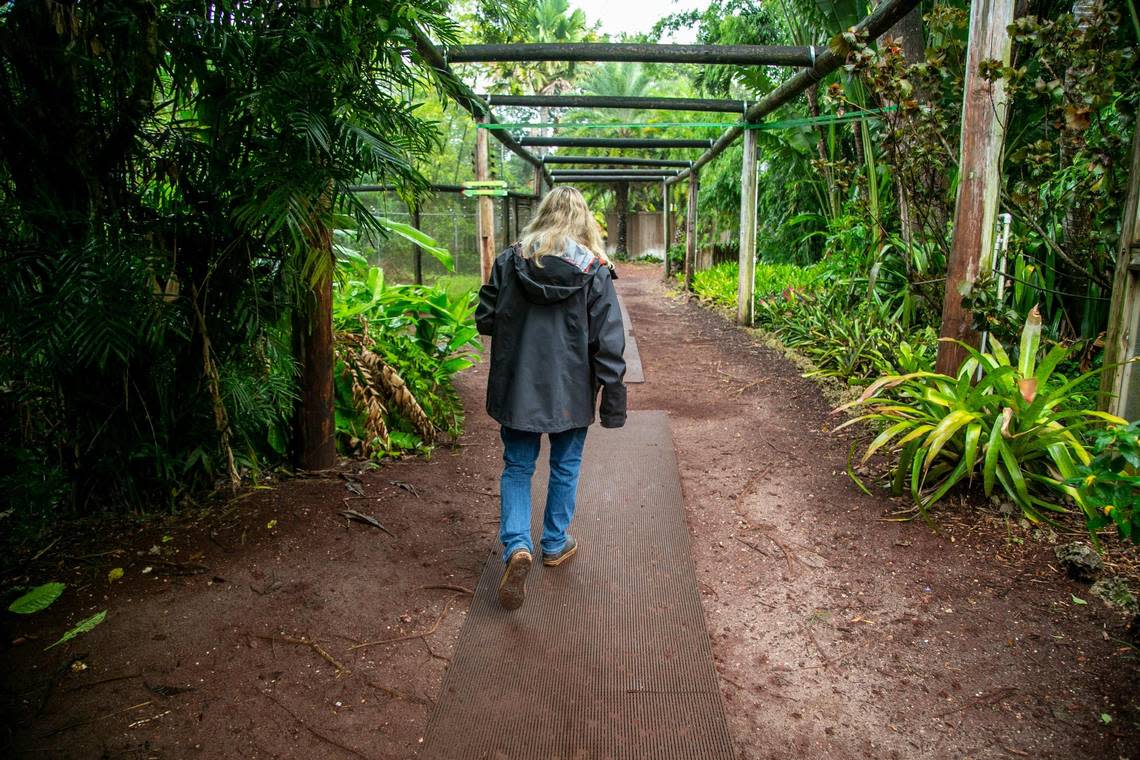Monkey Jungle’s big money trouble: Attraction sues for federal aid that could be lifeline
Burt the Java macaque seemed bored, perched atop a veranda overlooking empty seating where crowds once watched him and his brethren at Monkey Jungle, the old-school tourist attraction hidden in a 30-acre subtropical forest in rural South Miami-Dade.
Back then, Burt and other monkeys would frolic and chatter in a pool while munching boiled eggs or strawberries, much to the delight of guests. But on a recent visit, Burt and other monkeys around him appeared particularly unenthused, ignoring the berries floating on the water — as if they had lost interest without an audience there to watch.
Visitors have dwindled to a trickle at Monkey Jungle, a family-run animal attraction that stands among the last of its kind in South Florida. COVID-19 is the biggest reason why, but it’s really only the latest challenge in what has been a difficult last five years.
In its heyday, the venerable venue’s catchy slogan was once plastered on billboards across South Florida: “Where Humans are Caged and Monkeys Run Wild.” That close proximity of guests and primates is what long made the place special. But with the pandemic, that selling point turned into an existential threat. Primates can contract the highly contagious virus from humans.
So Monkey Jungle’s owners shut it down and, with no revenue stream for two years, still had to maintain a staff to care for hundreds of animals — a big, expensive, 365-days-a-year job.
“It’s kind of like a hospital with a lot of kids because the monkeys constantly need feeding and cleaning,” said Sharon DuMond, who runs Monkey Jungle, taking over a business started by her grandfather, almost by accident, 90 years ago. “You never stop thinking about it.”
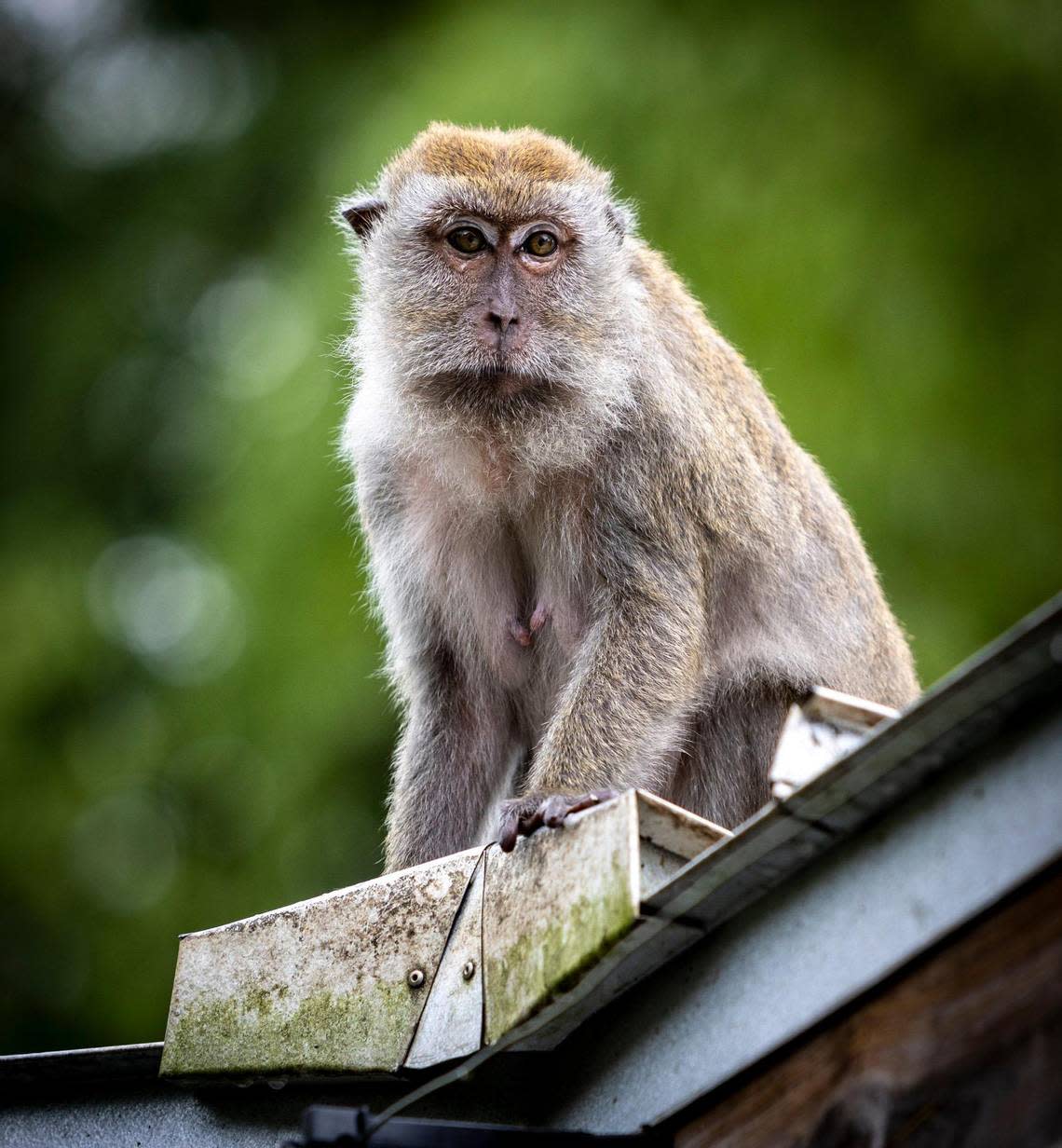
Now, Monkey Jungle is struggling to keep the gates open. Last year, it reopened at an extremely limited capacity, offering small guided tours that include hands-on mingling with monkeys at a ticket price of $150 per person. But its long-term future may depend on an unusual legal argument — that the monkeys should be classified as live performers, which would qualify it for a federal COVID relief grant designed to keep entertainment venues afloat.
The Small Business Administration has rejected Monkey Jungle’s application for a $653,000 grant. In August, DuMond filed a federal lawsuit seeking to reverse that decision.
“We’re an ecological and environmental entertainment venue,” DuMond said. “We feel like we fit into what they were looking to fund.”
Feds reject grant request
In May 2021, DuMond applied for what is technically called a “Shuttered Venue Operators Grant” from the Small Business Administration, hoping for a financial Hail Mary of sorts. The program was designed to provide emergency financial assistance for performing arts businesses stunted by COVID, offering a chance to get a grant worth up to 45% of pre-pandemic income. Payback is not required as long as facilities use the money for approved purposes.
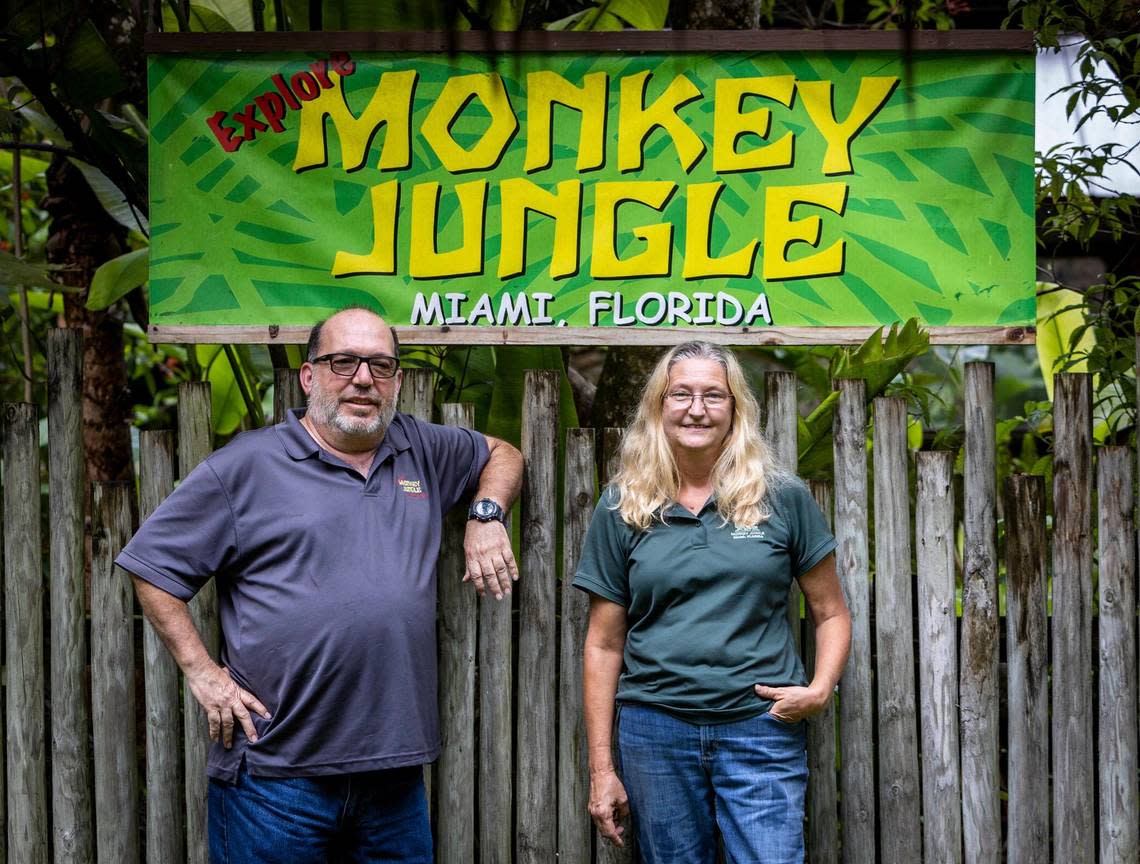
Under the agency’s rules, eligible businesses include “museum operators” and “live venue operators” among other enterprises. Monkey Jungle’s initial application made the argument that the hundreds of monkeys on the site are akin to live human performers.
To DuMond and Jungle staffers, that doesn’t seem like a stretch.
An online statewide historical archive, Florida Memory, is filled with videos and photos of past performances. In the 1960s, chimpanzees were occasionally dressed up as members of The Beatles and trained to put on “concerts.” Some played miniature pianos, beat drums or strummed guitars. Other photos show them pushed around in strollers or posing for photos with visitors. In more recent decades, such gimmicky shows — long criticized by animal rights activists at Monkey Jungle and a host of other vintage animal attractions — have been phased out. Modern exhibits and shows at Monkey Jungle now focus more on natural behavior.
But the Small Business Administration denied the application and an appeal. So this summer, Monkey Jungle sued, seeking not just the $653,000 grant but coverage of its legal fees. Court filings say the attraction is currently “operating at a negative cash-flow,” meaning it is burning more dollars than it can bring in.
“We are aware of dozens of prior lawsuits filed against the SBA related to the denial of applications under the SVOG program, some of which make similar claims as those made in our lawsuit,” said Matthew Feinberg, an attorney representing Monkey Jungle. “The SBA has agreed in some of those cases to revisit its prior SVOG decision, and we believe there are compelling reasons for the SBA to do so in our case.”
As of July, the SBA grant database reports 166 businesses in Miami-Dade County have received this funding — mostly comedy clubs, music venues and other more traditional live entertainment businesses. But Monkey Jungle’s lawsuit argues that circuses and rodeos elsewhere have also received funding. Even Zoo Miami, the database shows, won a grant — one for $7.4 million.
The federal agency has not offered an explanation for denying the Monkey Jungle grant, Feinberg said. It also did not respond to requests for comment from the Miami Herald.
Animal activist complaints
But the pandemic was only the attraction’s latest and most difficult problem. Monkey Jungle has long been criticized by animal rights activists, though it has never drawn the level of scrutiny of the Miami Seaquarium, where Lolita the orca has been confined in a tank for more than a half-century and there have been a string of recent questions raised by federal inspectors.
But in 2017, Monkey Jungle was hit with perhaps its highest-profile complaint when more than a half dozen former trainers accused DuMond and the jungle’s management of animal abuse, citing examples of medical mistreatment, unclean conditions and malnutrition. Monkey Jungle’s management denied the accusations, defending the care of the attraction’s menagerie, which includes more than a half dozen primate species and more than 350 animals in all.
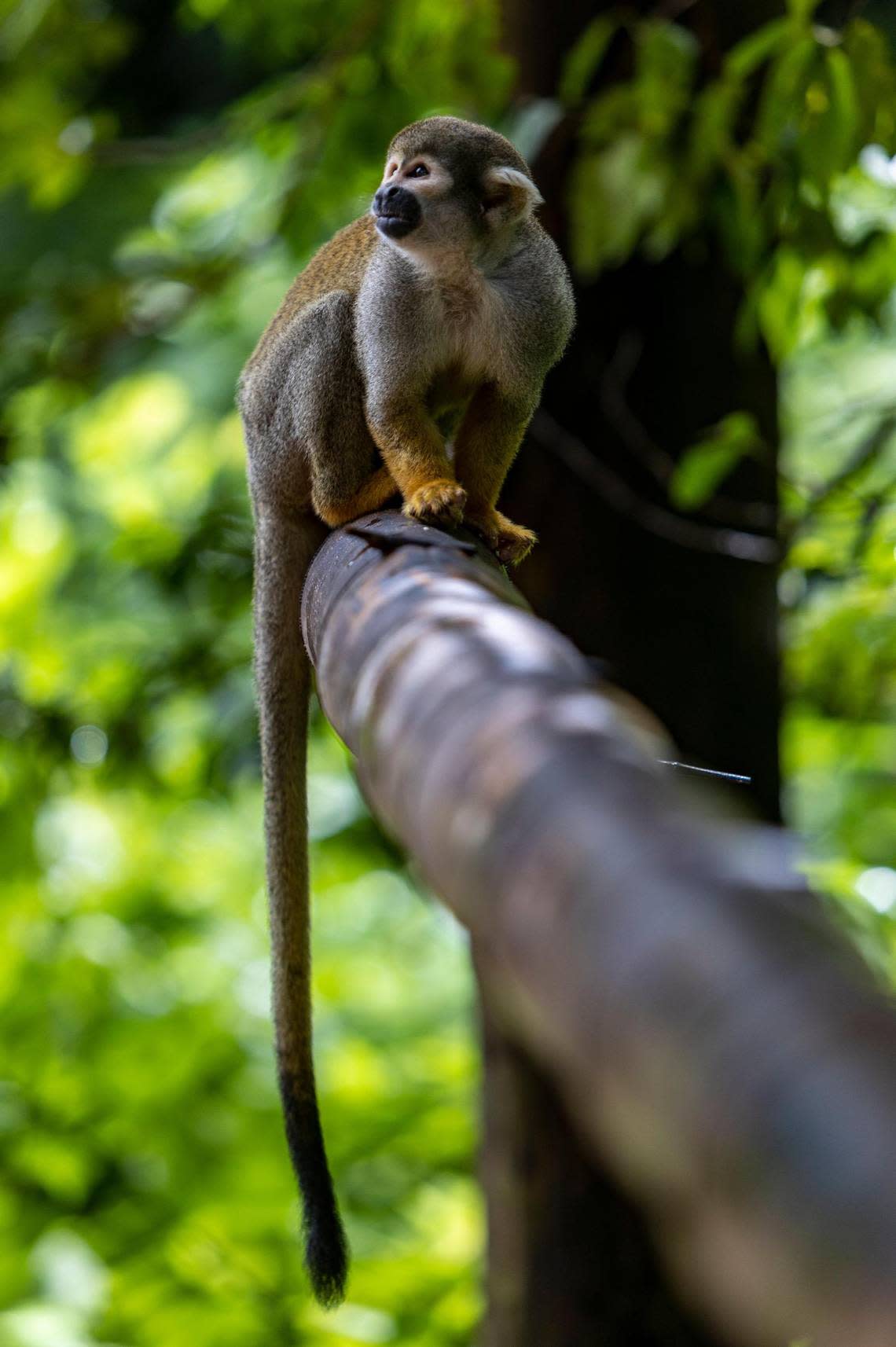
The United States Department of Agriculture, which conducts annual inspections of the property, subsequently launched a “focused inspection” in 2018 as a response to the allegations. That came back clean, with no “non-compliant” items reported. Andrea McNally, who works for the USDA’s Animal and Plant Inspection Service, said seven annual inspection reports dating back to 2015 found on the agency’s online databases show no enforcement action imposed on the facility.
But Monkey Jungle’s money troubles had continued to mount. In September 2017, Hurricane Irma raked the lush grounds, forcing an eight-month closure and a big blow to the bottom line of the business. The park reported an estimated $400,000 in damage from the hurricane. Then, in early 2020, came the staggering challenge of COVID.
Still, despite the string of controversies and financial difficulties, DuMond said she is willing to risk the cost of a court battle, one she could potentially lose. To her, Monkey Jungle isn’t just a business, it’s a family heirloom — where she grew up, helping her parents run the place when she was under 10 years old by bagging peanuts and labeling raisin boxes. More than all that, it’s one of the few attractions of its kind still standing in South Florida. Its closure could mean the end of an era.
Long, colorful history
Monkey Jungle was created in the 1930s, along with dozens of other Florida roadside attractions that would follow, to draw tourists who poured into the state as motorcars became increasingly popular.
The attraction was more elaborate and exotic than many, featuring tunnels of trails snaking through the property — all encased with metal fencing so visitors were “caged,” walking beneath and beside free-roaming monkeys. For decades, it was featured in travel brochures advertising “Florida’s Finest Attractions,” but it also drew locals. Some families made regular visits to experience a nostalgic slice of old Florida tucked away less than an hour from the glitz of Miami Beach.
Judging by social media reviews, it has not lost its appeal for many visitors. One poster on the jungle’s Facebook page called the jungle a “core childhood memory.” Another guest on Yelp said she visited for the first time in January, under the limited guided program, and called it the “highlight” of her trip to Miami.
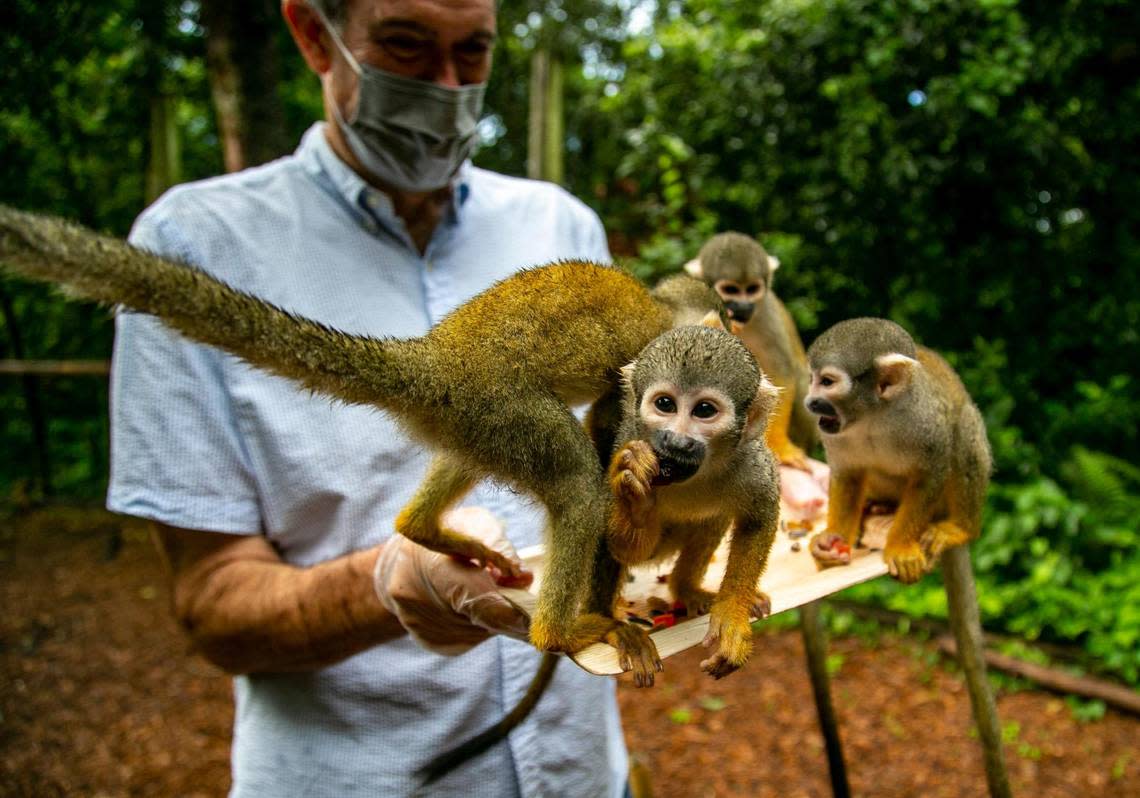
Sharon DuMond’s grandfather, Joseph DuMond, was a commercial artist and an animal behaviorist interested in establishing a monkey research facility. That was his intention when he originally purchased 10 acres of the land that is now part of the jungle. As an experiment, he released six Java macaques onto the property. Today, all of the 150 Java macaques that live at Monkey Jungle, like adorable little Burt, are descendants of those original six monkeys.
As it turned out, passersby on U.S. 1 were interested in researching the monkeys for themselves. People wanted to see them swing from branch to branch in a sea of gumbo limbo trees and palms. The DuMonds began charging admission soon after, formally opening Monkey Jungle in 1933, adding on and building it out over the decades.
“By the end of the 1930s, the Monkey Jungle was on its way to becoming one of Dade County’s premier tourist attractions,” wrote Paul George, resident historian of HistoryMiami Museum, in his 1995 book “A Journey Through Time: A Pictorial History of South Dade.”
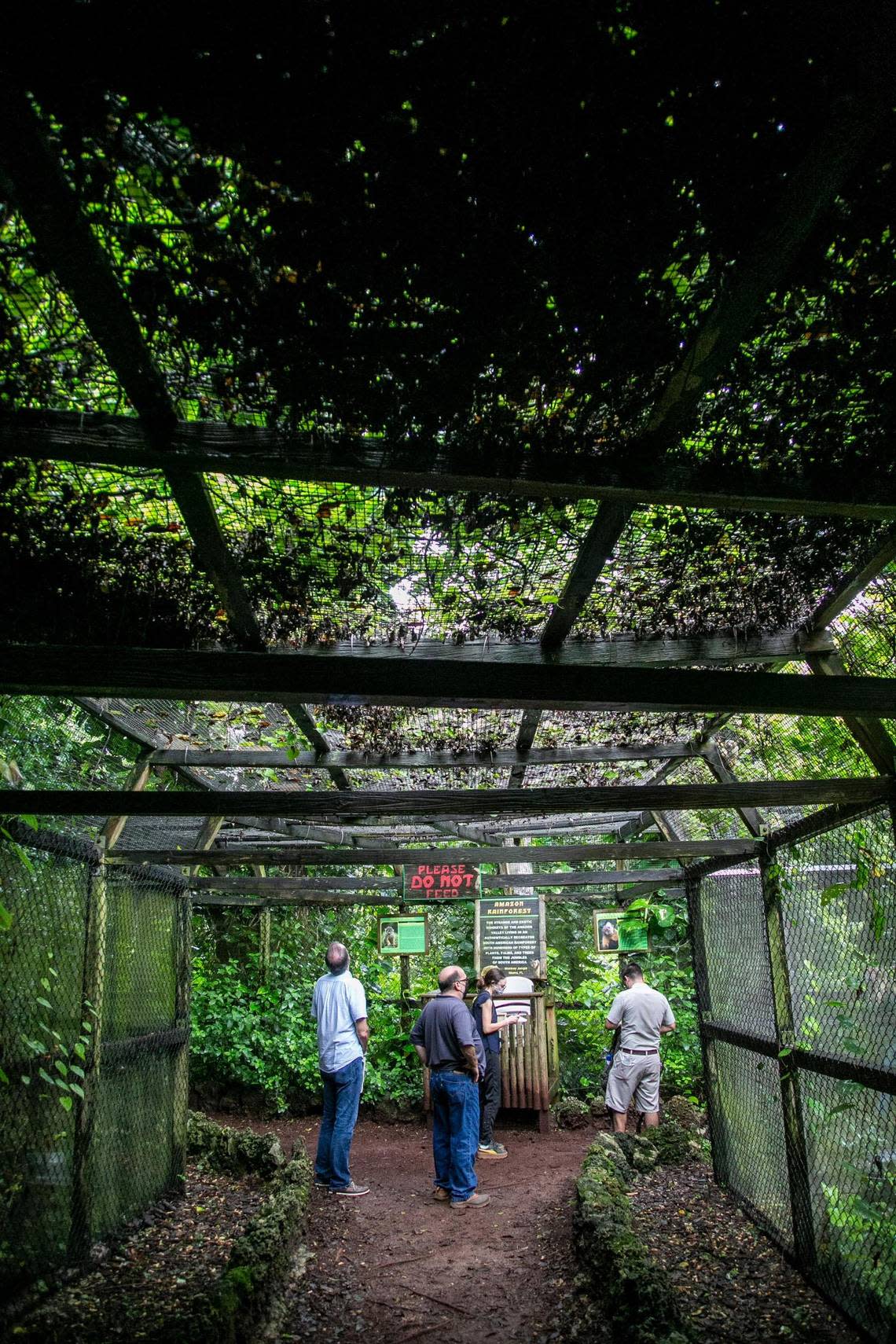
After DuMond and his wife, Grace, died, their daughter Mary took over. Sharon DuMond and her brother Frank DuMond now co-own it, but Sharon runs the daily operation. She is now the third generation to run Monkey Jungle.
“I was going to go to business school when I graduated from college, but my mother died the year after I graduated and it got left in my lap,” DuMond said. “So I was kind of like, ‘OK, what do I do now?’ You just have to run with it. Everybody and every animal here is family. It gets in your blood. It’s a passion.”
She hopes it stays in the family, but she’s not sure who would take over. And mom-and-pop attractions like Monkey Jungle are no longer the big draws they once were, for a host of reasons.
Development and rising land values have doomed some old sites in the southern half of Miami-Dade. Fennell’s Orchid Jungle, a botanical garden previously in Homestead, was dubbed by the Library of Congress as one of the earliest roadside attractions in South Florida and nationally significant for research in propagating orchids. It has since closed. The Miami Serpentarium, once located on U.S. 1 in pricey Pinecrest, closed in 1984, not long after a small boy was killed after accidentally falling in a crocodile pit. The Miami Rare Bird Farm, too. Parrot Jungle, once located in a cypress and park hammock in Pinecrest packed with colorful birds, opened in 1936 but moved in 2003 to a theme-parkish site on Watson Island.
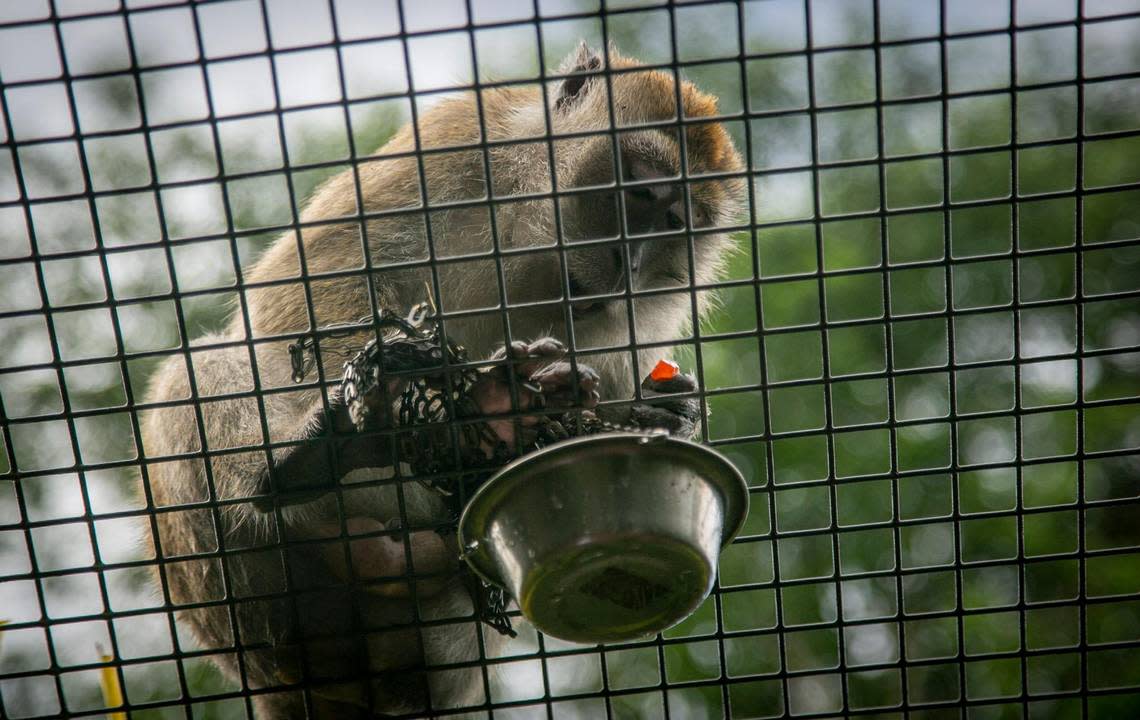
But times have changed as well, with the digital wizardry of Orlando theme parks eclipsing the wonder of flesh and fur wildlife.
“I really think the orientation of tourists’ tastes has moved away from these outdoor attractions,” said George. “We’ve become just so patched over by cement that a lot of people really don’t think much about South Dade in terms of natural attractions. There’s very little left down there.”
Still hope to reopen
Today, only 20 people are allowed in Monkey Jungle’s 30 acres at any one time. There is no longer any drive-by traffic. Visitors now must be masked and make reservations for private tours. The tours are offered three times a day at $150 per person. The cost seems steep, but people still regularly pay for the tours — though there’s far less of a crowd than in pre-pandemic days.
“There were times where we had 20 people on every tour or when we’ve had five people on every tour,” said Steve Jacques, director of Monkey Jungle for more than 30 years. “It’s really unpredictable right now. COVID has been the biggest thing we’ve ever dealt with, as far as length of time.”
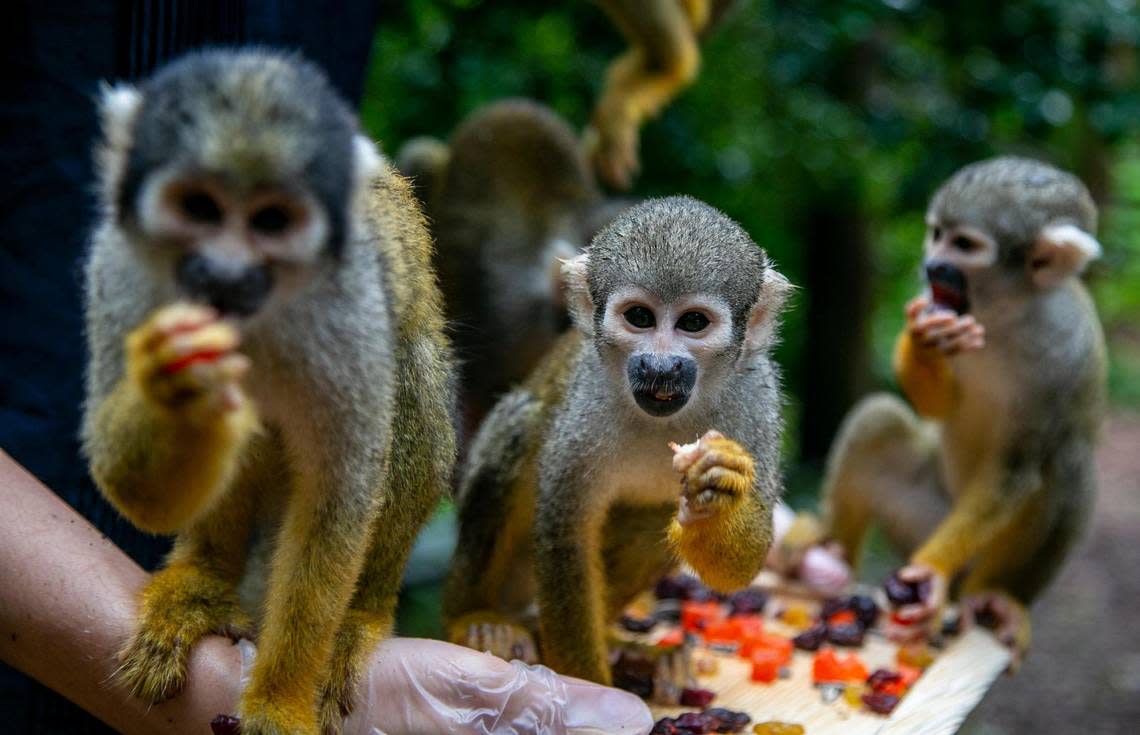
Though Monkey Jungle managers said none of the animals have gotten the virus or died from it, their concern about a pandemic among the primates wasn’t unfounded. The Centers for Disease Control and Prevention has reported that cases of humans spreading the disease to primates have been documented worldwide. And, just like in humans, the virus can be deadly.
The ripple effects of COVID also were huge for the human workers at Monkey Jungle. The number of staff has thinned down to 14 members. DuMond often has to mow the grass, pressure clean the walls and paint the property herself. Still, she thinks the extra work is worth it, so long as the jungle stays open.
Right now, with COVID concerns and restrictions fading, Monkey Jungle is planning for a wider reopening in December, though details have not yet been worked out and will depend on the latest threats from COVID’s numerous variants. That’s the plan, regardless of the outcome of the lawsuit. DuMond said she’s determined to preserve the legacy of her family. Bringing revenue out of the red would be a big first step.
“We’re hoping to open before the end of the year. We have a lot to do to ramp back up to full capacity,” DuMond said. “I think that when we do reopen, it’s going to be a little bit more of an abbreviated version, and we’re gonna slowly unfold.”
